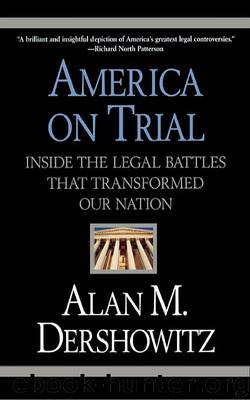America on Trial by Alan M. Dershowitz

Author:Alan M. Dershowitz [DERSHOWITZ, ALAN M.]
Language: eng
Format: epub
ISBN: 9780759511033
Publisher: Grand Central Publishing
Published: 2009-10-30T16:00:00+00:00
The Alger Hiss Case
Date: 1949–50
Location: New York City, New York
Defendant: Alger Hiss
Charge: Perjury
Verdict: Guilty
Sentence: Imprisonment for five years
Few cases have divided the nation, and defined an age, more sharply than the Whittaker Chambers–Alger Hiss imbroglio in the post–World War II decade. Even more than the Rosenberg case, the Hiss case mirrored the Cold War. The Rosenbergs were, after all, obscure children of immigrants. Alger Hiss—a Harvard Law School graduate who clerked for Justice Oliver Wendell Holmes—was the personification of the Roosevelt revolution: He served trusted roles in the New Deal, the preparation for and fighting of World War II, the Yalta Conference near war’s end, and the establishment of the United Nations to prevent future wars. He was one of the Roosevelt administration’s fair-haired boys, among its best, brightest, and most presentable embodiments, though the extent of his actual influences on policy making has been questioned.
It is difficult to imagine, more than half a century later, what it must have been like when a senior editor of Time magazine, Whittaker Chambers—himself an admitted former Communist undercover agent—accused Alger Hiss of having served as a So viet agent while employed by the government. Not since Benedict Arnold and Aaron Burr had an individual with so high a position in government been accused of so serious a breach of loyalty. Hiss denied the charges under oath before a House subcommittee headed by an obscure young congressman named Richard Nixon.
The testimony of the two men diverged so sharply that it soon became clear that one of them would be charged with perjury. That one was Alger Hiss. His prosecution became a cause célèbre, dividing Americans as few other cases have done. This division did not fall along class or even party lines, as is the case with most such controversies. Hiss was an upper-crust elitist whose supporters included Supreme Court justices, former secretaries of state, and other prominent politicians and statesmen from both parties.
Even following his eventual conviction—after a deadlocked jury at the first trial—Americans remained divided over whether a terrible miscarriage of justice had occurred.
More than a quarter century later, in 1972, a young Cold War historian named Allen Weinstein set out to prove Hiss’s innocence. With the help of the American Civil Liberties Union, he filed a lawsuit under the Freedom of Information Act to obtain secret files on the case. Weinstein interviewed hundreds of witnesses, including Alger Hiss himself, and those closest to him. Then, suddenly, the young historian experienced an epiphany: He realized that Hiss was, in fact, guilty. Historical objectivity required Weinstein to change his expected conclusion and reveal the truth, painful as that would be.
This, at least, is the version Allen Weinstein would have us believe. It may well be true, but this sort of transformation is becoming too common not to raise some suspicion. In 1986, I commented on this phenomenon in a book review I wrote for the Washington Post about the Sacco and Vanzetti case:
Download
This site does not store any files on its server. We only index and link to content provided by other sites. Please contact the content providers to delete copyright contents if any and email us, we'll remove relevant links or contents immediately.
The Secret History by Donna Tartt(16606)
The Social Justice Warrior Handbook by Lisa De Pasquale(11485)
Thirteen Reasons Why by Jay Asher(7779)
This Is How You Lose Her by Junot Diaz(5753)
Weapons of Math Destruction by Cathy O'Neil(5027)
Zero to One by Peter Thiel(4816)
The Myth of the Strong Leader by Archie Brown(4785)
Promise Me, Dad by Joe Biden(4439)
Stone's Rules by Roger Stone(4412)
Beartown by Fredrik Backman(4403)
How Democracies Die by Steven Levitsky & Daniel Ziblatt(4392)
The Fire Next Time by James Baldwin(4336)
100 Deadly Skills by Clint Emerson(4070)
A Higher Loyalty: Truth, Lies, and Leadership by James Comey(4024)
Rise and Kill First by Ronen Bergman(4008)
The David Icke Guide to the Global Conspiracy (and how to end it) by David Icke(3875)
The Farm by Tom Rob Smith(3869)
Secrecy World by Jake Bernstein(3773)
The Doomsday Machine by Daniel Ellsberg(3725)
